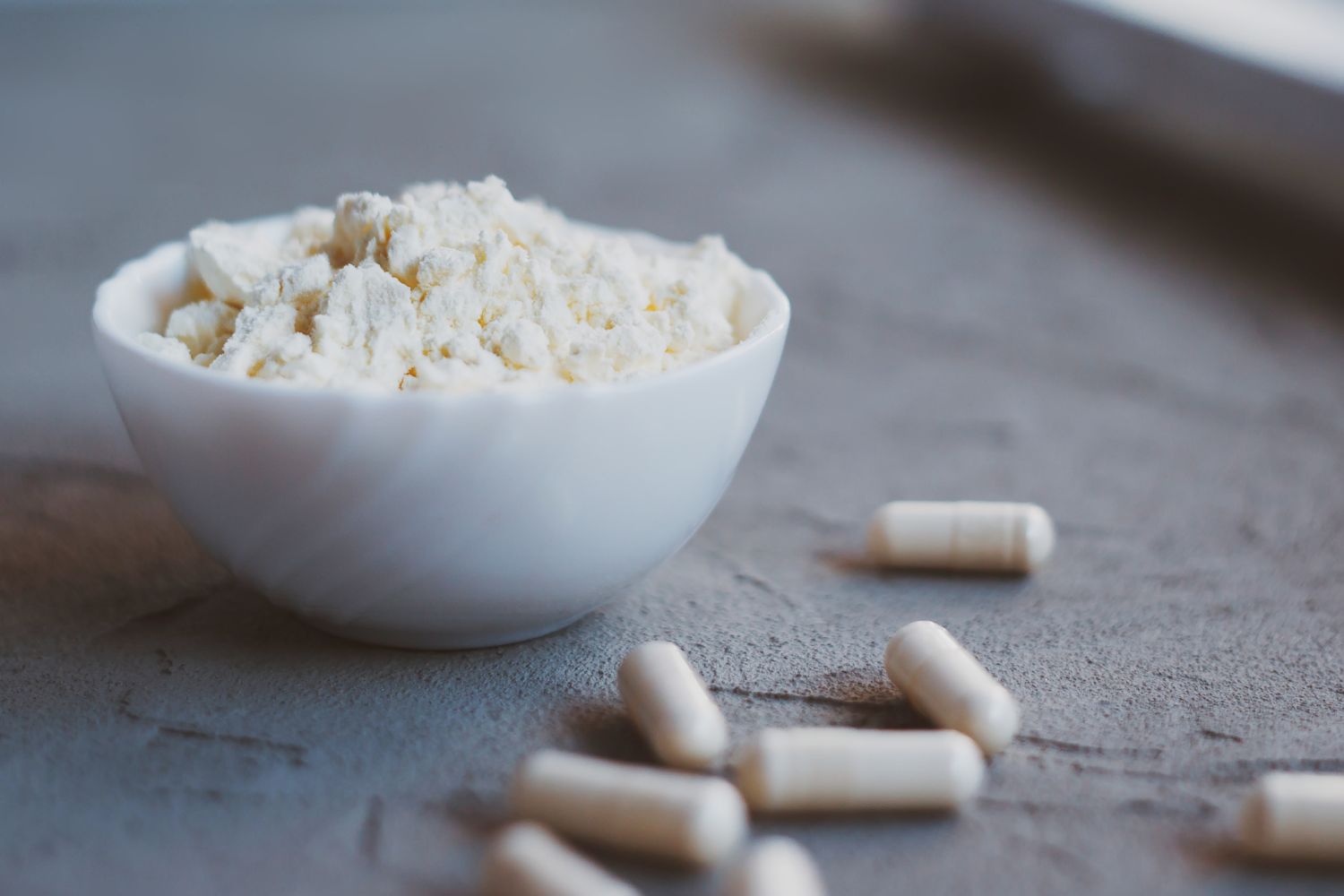Growing awareness of gut health’s impact on overall wellness has driven demand for supplements for gut health, making them a profitable category for wellness brands. Consumers recognize the connection between a healthy gut microbiome, digestion, immune system function, and even mental health, fueling interest in probiotic supplements and other digestive health products.
For businesses looking to expand their offerings, understanding gut health supplements, their key ingredients, and market trends is essential. This guide covers the health benefits, product types, and best practices for developing a successful gut health supplement line.
What Are Probiotic and Gut Health Supplements?
Probiotic supplements and gut health supplements support digestive health, immune system function, and overall wellness by promoting a healthy gut microbiome. These products contain live microorganisms, digestive enzymes, or prebiotic and postbiotic blends that help maintain a balanced gut microbiota.
A strong gut barrier aids in the body’s ability to absorb nutrients, regulate bowel movements, and reduce digestive discomfort. With consumers increasingly seeking dietary supplements for gut health, wellness brands have an opportunity to meet this demand by offering effective solutions for digestive system support.

Key Benefits for Consumers:
- Supports Digestion: May aid in digestion and support regularity.
- Strengthens the Immune System: A healthy gut microbiome plays a role in immune function, but more research is needed to confirm its impact on infection risk.
- Enhances Mental Health: Research suggests a connection between gut health and mental well-being, but further studies are needed to understand this relationship fully.
- Aids Nutrient Absorption: A balanced digestive tract helps the body absorb nutrients more efficiently.
- Reduces Digestive Issues: May support gut balance, which could benefit those with digestive sensitivities.
- Promotes Skin Health: The gut-skin axis links gut balance to skin health, making these supplements beneficial for clearer skin.
- Encourages Weight Management: Some studies suggest that certain probiotic strains may influence metabolism, but more research is needed to determine their role in weight management.
- Balances Gut Bacteria: Helps maintain a balance of gut bacteria associated with digestive wellness.

Types of Probiotic and Gut Health Products Your Brand Can Offer
Wellness brands can offer a variety of gut health supplements to meet different consumer needs. These products range from daily capsules to fermented foods and functional powders, providing multiple ways to support gut health.
Daily Probiotic Capsules
Capsules are a convenient option for maintaining gut microbiota balance. They contain live microorganisms, such as Lactobacillus acidophilus, and two highly researched strains of probiotic bacteria to enhance overall gut health. Available in once-a-day capsule formulations, these supplements target digestion, immune system support, and bowel regularity. Some brands offer eight other probiotic strains for more comprehensive benefits.
Prebiotic Supplements
Prebiotics are non-digestible fibers that feed good bacteria in the gut. These supplements help maintain a healthy gut microbiome by promoting the growth of beneficial bacteria. Popular options include soluble fiber powders and inulin-based capsules, which work alongside probiotic strains to enhance digestive health and support blood sugar regulation.
Digestive Enzymes
These digestive supplements contain enzymes that help break down proteins, fats, and carbohydrates, preventing digestive discomfort like upset stomach or bloating. Enzyme blends target lactose intolerance, food intolerances, and general digestive system efficiency. Consumers looking to optimize digestion and absorb nutrients more effectively often choose these supplements.
Probiotic Powders
Probiotic powders offer a versatile way to support gut health. They can be mixed into water, smoothies, or fiber-rich foods to improve digestive health. Some formulas include scientific evidence-backed probiotic strains, vitamin C, and whole grains for additional health benefits. These powders are ideal for consumers who prefer alternatives to capsules.
Synbiotic Blends (Probiotics + Prebiotics)
Synbiotics combine probiotic supplements with prebiotics to provide comprehensive gut health support. Available in capsules and powders, these blends promote the growth of good gut bacteria while nourishing the digestive tract. Combining certain foods and live microorganisms in synbiotics may further support a healthy immune system and digestive health.
Fermented Superfood Blends
These blends combine fermented foods with probiotic strains to enhance overall health. Options include fermented greens powders and superfood blends that contain healthy bacteria, antioxidants, and short-chain fatty acids. These products appeal to consumers looking for digestive health support with added potential benefits for skin health and cardiovascular disease prevention.

Key Ingredients to Include in Probiotic and Gut Health Supplements
Effective gut health supplements contain a combination of probiotic strains, prebiotic fibers, digestive enzymes, and other functional ingredients that support overall gut health. Each component plays a role in maintaining a healthy gut microbiome, enhancing digestion, and promoting immune system function.
Probiotic Strains (Lactobacillus, Bifidobacterium, Saccharomyces)
Different probiotic strains offer unique health benefits. Lactobacillus acidophilus helps maintain a balanced gut microbiota and supports digestion, particularly for those with lactose intolerance. Bifidobacterium is known for its role in strengthening the immune system and reducing digestive discomfort. Saccharomyces boulardii is a yeast studied for its potential role in gut balance. Selecting two highly researched strains or a blend of eight other probiotic strains can enhance the effectiveness of a gut health supplement.
Prebiotic Fibers (Inulin, FOS, XOS)
Prebiotics, such as inulin, fructooligosaccharides (FOS), and xylooligosaccharides (XOS), act as fuel for good gut bacteria, encouraging their growth. These fibers promote a healthy gut microbiome, improve bowel regularity, and help regulate blood sugar. Found naturally in whole grains and fiber-rich foods, prebiotics enhance the effectiveness of probiotic supplements by creating an optimal environment for healthy bacteria to thrive.
Digestive Enzymes (Protease, Lipase, Amylase)
Digestive enzymes break down food into absorbable nutrients, reducing digestive discomfort such as bloating or an upset stomach. Protease assists in protein digestion, lipase helps break down fats, and amylase processes carbohydrates. These enzymes support the digestive system, prevent food intolerances, and promote better nutrient absorption, making them a valuable addition to digestive supplements.
Fermented Ingredients
Fermented foods and herbs contain good bacteria that support overall gut health. Fermented greens, vegetables, and superfoods provide short-chain fatty acids, which strengthen the gut barrier and enhance digestion.
Benefits of Fermented Ingredients:
- Enhances Nutrient Absorption: Improves bioavailability of vitamins and minerals.
- Supports a Healthy Gut Microbiome: Promotes healthy bacteria and reduces an unhealthy gut.
- Aids Digestion: Helps break down complex foods, preventing digestive discomfort.
- Boosts Immune Health: May support immune function as part of a balanced gut microbiome.
Botanical Additions (Ginger, Turmeric)
Herbal ingredients like ginger and turmeric provide natural digestive health support. Ginger helps soothe the digestive tract, reducing abdominal pain and nausea. Turmeric has anti-inflammatory properties and may support gut barrier function, but its impact on cardiovascular health requires more research. These botanical additions enhance the effectiveness of gut health supplements.
Postbiotics
Postbiotics are the byproducts of probiotic activity, including short-chain fatty acids, enzymes, and peptides. Research is ongoing to determine their role in digestive and immune health. Emerging research suggests that postbiotics may provide similar advantages to live microorganisms while being more stable, making them a promising addition to gut health supplement formulations.

Formulating Your Probiotic and Gut Health Supplement Line
Developing an effective gut health supplement requires selecting the right ingredients, ensuring proper dosing, and considering product stability. Wellness brands should focus on creating scientifically backed formulas that meet consumer needs for digestive health, immune system support, and overall wellness.
Selecting High-Quality Strains
Choosing probiotic strains with scientific evidence of effectiveness ensures reliable health benefits. Strains such as Lactobacillus acidophilus and Bifidobacterium are commonly used for their ability to support gut health, aid digestion, and promote a healthy immune system. Partnering with suppliers that provide clinical nutrition data helps establish credibility in the dietary supplements market.
Ensuring Proper Dosage and Potency
The effectiveness of probiotic supplements depends on colony-forming units (CFUs), which indicate the number of live microorganisms per dose. A gut health supplement should contain billions of CFUs to ensure viability, with strain-specific dosing recommendations. Further research on CFU stability and scientific evidence supports optimal dosing strategies for targeted digestive health benefits.
Capsule vs. Powder Form
Choosing between once-a-day capsules and powders depends on consumer preferences. Daily probiotic capsules offer convenience, while probiotic powders allow for flexible dosing and easy mixing with certain foods. Some consumers prefer powders mixed with soluble fiber or fermented foods for enhanced digestive system support.
Stability and Shelf Life
Probiotic strains must remain active until consumption, requiring proper storage conditions. Some formulations require refrigeration, while others use encapsulation technology to withstand an acidic environment in the stomach. Ensuring stability and shelf life helps maintain live microorganisms’ effectiveness and prevents harmful contaminants from compromising product quality.
Transparency in Labeling
Providing clear, accurate product information builds consumer trust and aligns with health office regulations. Labels should include strain-specific details, CFU counts, and ingredient sources.
Tips for Transparent Labeling:
- List Specific Strains: Clearly name probiotic strains used (e.g., Lactobacillus acidophilus).
- Indicate CFU Count: Specify CFUs at the time of manufacture and expiration.
- Highlight Additional Ingredients: Include digestive enzymes, prebiotic fibers, and botanical extracts.
- Provide Usage Instructions: Recommend taking on an empty stomach or with meals for best results.
- Include Allergen Warnings: Mention potential allergens for consumers with food intolerances.

Understanding the Consumer: Targeting Gut Health-Focused Audiences
Consumers interested in gut health supplements often seek solutions for digestive health, immune system support, and overall wellness. Identifying their needs and addressing their concerns helps brands create effective marketing and educational strategies.
Identifying Key Consumer Segments
The market for probiotic supplements includes several key demographics. Individuals with digestive discomfort, food intolerances, or IBS symptoms look for products that improve bowel regularity and reduce abdominal pain. Immunity-conscious consumers choose gut health supplements to strengthen their healthy immune system and prevent illness.
Others seek dietary supplements to maintain overall gut health, support mental health, or improve skin health through the gut-skin axis. Understanding these groups helps brands develop targeted messaging.
Top Consumer Concerns
Shoppers often have questions about probiotic strains, effectiveness, and possible side effects. Many worry about CFU counts, the ability of live microorganisms to survive the digestive system, and the impact of acidic environments on potency.
Some consumers experience digestive discomfort when starting a gut health supplement, leading them to question ingredient quality. Addressing concerns about potential benefits, proper usage, and scientific evidence builds trust and encourages long-term use.
Educating Your Audience
Providing clear information on gut health, digestive supplements, and the role of good bacteria helps consumers make informed decisions. Education should highlight how probiotic supplements promote a healthy gut microbiome, aid digestion, and reduce unhealthy gut symptoms. Brands can use blogs, infographics, and social media to explain the health benefits of prebiotic and postbiotic blends, fermented foods, and digestive enzymes, making complex topics more accessible.

Marketing Strategies for Your Probiotic and Gut Health Product Line
Effective marketing positions gut health supplements as essential for digestive health, immune system function, and overall wellness. Brands highlighting scientific evidence, customer success stories, and expert endorsements gain credibility in the competitive dietary supplements market.
Positioning Your Products
Framing probiotic supplements as a part of daily wellness helps attract long-term customers. Messaging should emphasize benefits beyond digestion, such as mental health support and immune protection.
Tips for Positioning Probiotics:
- Promote Daily Use: Encourage consistent supplementation for sustained gut microbiota balance.
- Link Gut and Overall Health: Explain how a healthy gut microbiome affects mental health, skin, and immunity.
- Offer Targeted Formulas: Market products for specific needs, such as digestive enzymes for food intolerances or synbiotic blends for gut balance.
- Highlight Convenience: Showcase once-a-day capsule options and easy-to-mix probiotic powders.
Highlighting Science-Backed Benefits
Consumers trust brands that provide scientific evidence for their claims. Research-backed probiotic strains, such as Lactobacillus acidophilus and Bifidobacterium, have well-documented health benefits for digestion and immunity. Citing peer-reviewed research from reputable institutions like Johns Hopkins Medicine or the National Center for Health Research reinforces credibility.
Building Brand Authority with Educational Content
Offering valuable content on gut health, digestive tract function, and dietary supplements positions a brand as a trusted source. Blogs, videos, and infographics can explain topics like prebiotic and postbiotic blends, the effects of whole grains on gut bacteria, and how to maintain a healthy gut microbiome. Providing evidence-based insights helps consumers understand the role of probiotic supplements in human health.
Using Social Proof and Customer Testimonials
Consumers rely on reviews and testimonials to evaluate gut health supplements. Positive feedback on improved gut health, relief from digestive discomfort, or enhanced immune system function builds trust. Featuring real experiences through video testimonials, social media reviews, and case studies demonstrates the potential benefits of your products.
Engaging Influencers and Healthcare Professionals
Collaboration with healthcare providers, wellness influencers, and nutrition experts can expand a brand’s reach. Influencers help promote products through personal testimonials, while registered dietitians and clinical nutrition specialists provide professional endorsements. Partnering with experts increases credibility and encourages consumers to prioritize gut health supplements in their daily routine.

Compliance and Quality Assurance for Probiotic and Gut Health Supplements
The dietary supplements industry must meet regulatory requirements and ensure product quality. Brands must comply with FDA guidelines, conduct third-party testing, and obtain relevant certifications to gain consumer trust.
FDA Compliance and Labeling
The FDA regulates probiotic supplements as dietary supplements, requiring accurate labeling and health claims based on scientific evidence. Brands must ensure their packaging includes CFU counts, ingredient lists, and suggested use. Claims related to digestive health, immune system support, or weight loss must be backed by credible research to avoid misleading consumers.
Third-Party Testing
Independent third-party testing verifies strain identity, potency, and purity. Testing ensures that products contain the live microorganisms listed on the label and are free from harmful contaminants. Reliable testing labs confirm CFU counts during manufacture and expiration, maintaining transparency and quality.
Certifications to Enhance Trust
Certifications assure consumers that gut health supplements meet high safety, purity, and sustainability standards.
Key Certifications for Probiotic Supplements:
- GMP (Good Manufacturing Practices): Ensures safety and quality standards compliance.
- NSF Certification: Verifies product testing and ingredient integrity.
- USDA Organic: Confirms the use of organic, non-GMO ingredients.
- Vegan & Gluten-Free Labels: Appeals to consumers with dietary restrictions or food intolerances.
- Non-GMO Verified: Assures products do not contain genetically modified ingredients.
Building a Successful Gut Health Supplement Brand with Quality and Transparency
The demand for gut health supplements continues to grow, providing wellness brands with a strong market opportunity. Developing probiotic supplements with high-quality ingredients, effective formulations, and scientific evidence ensures consumer trust and product success. Focusing on digestive health, immune system benefits, and consumer education helps brands differentiate in a competitive space.
Transparency in labeling, third-party testing, and clear communication about health benefits further establish credibility. By prioritizing product quality and educating consumers on gut microbiome support, brands can create supplements that promote overall wellness and long-term customer loyalty.
Frequently Asked Questions
What are the best strains for a general probiotic supplement?
Effective probiotic supplements often include Lactobacillus acidophilus for digestion, Bifidobacterium for immune system support, and Saccharomyces boulardii for gut barrier protection.
How do prebiotics differ from probiotics, and should I offer both?
Prebiotics are fibers that feed good gut bacteria, while probiotics are live microorganisms that support digestive health; combining both in a synbiotic blend enhances effectiveness.
What CFU count is ideal for probiotic supplements?
The ideal CFU count for a probiotic supplement varies by strain and intended use. Consulting scientific studies on specific strains can help determine an appropriate dosage.
Are probiotics safe for everyone, and are there any side effects?
Most people tolerate probiotic supplements well, but some may experience mild digestive discomfort, such as gas or bloating, which usually improves with regular use.
How can I ensure the stability of probiotics in my product line?
Using encapsulation technology, selecting strain-specific formulations, and maintaining proper storage conditions help protect live microorganisms from degradation.
References
- Assimakopoulos, S. F., Triantos, C., Maroulis, I., & Gogos, C. (2018). The Role of the Gut Barrier Function in Health and Disease. Gastroenterology research, 11(4), 261–263. https://doi.org/10.14740/gr1053w
- National Institutes of Health. (2023). Probiotics – Health Professional Fact Sheet. https://ods.od.nih.gov/factsheets/Probiotics-HealthProfessional/
- O’Neill, C. A., Monteleone, G., McLaughlin, J. T., & Paus, R. (2016). The gut-skin axis in health and disease: A paradigm with therapeutic implications. BioEssays : news and reviews in molecular, cellular and developmental biology, 38(11), 1167–1176. https://doi.org/10.1002/bies.201600008
- Romero, M., & Duarte, J. (2023). Probiotics and Prebiotics in Cardiovascular Diseases. Nutrients, 15(17), 3686. https://doi.org/10.3390/nu15173686
- Yoo, S., Jung, S. C., Kwak, K., & Kim, J. S. (2024). The Role of Prebiotics in Modulating Gut Microbiota: Implications for Human Health. International journal of molecular sciences, 25(9), 4834. https://doi.org/10.3390/ijms25094834



